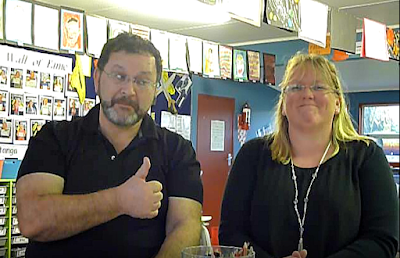Case
study Towards Reconceptualising Leadership: The Implications of the Revised New
Zealand Curriculum for School Leaders
Wayne Freeth University of Canterbury, Christchurch, New
Zealand with Vanessa de Oliveira Andreotti University of Oulu, Finland
This was an interesting case study to read around
leadership and the Revised New Zealand Curriculum, although the article did seem to progress on to a more of review of the researchers own thoughts.
I found the most informative part of this article was the first part, before the researcher started on their own review of their personal findings.
It was interesting to read the authors overview of working
with a group of Principals and Middle Management as they navigated their way
through the Revised New Zealand Curriculum and the way the author tried to
engage these school leaders.
It made good reading to see the pitfalls and “surprise”
outcomes for the author and how he had to readjust his thinking and
expectations, and how he adapted his work.
I found it interesting that the principals and middle
school managers were asked to look at knowledge as a noun and as a verb.
Interesting
Quotes from the Case Study
Quote
1
The theoretical framework of this project draws on the work
of Gilbert (2005) with reference to the ‘knowledge society’. Gilbert challenges
long-held views about education and knowledge, making a distinction between
knowledge conceptualised as a noun and a verb. In her outline of the
differences, knowledge conceptualised as a verb is something we do something
with, rather than something we have; it is linked with performativity rather
than truth, and it is more like an ‘energy’ than building blocks that can be
accumulated. This has several implications for the area of leadership.
Knowledge conceptualised as a noun tends to enable autocratic and bureaucratic
styles of leadership, while knowledge conceptualised as a verb may enable
democratic, distributed and transformational styles of leadership, which are
necessary for the effective implementation of the NZC, particularly in terms of
the principles of inclusion and community participation in the co-construction
and the co-ownership of the curriculum. Another important aspect of the NZC
that is emphasised by the conceptualisation of knowledge as a verb is the role
of teachers as leaders in the construction of the curriculum and in responding
to the needs of diverse students.
(Page 2)
Quote
2
Katzenmeyer and Moller (2009, p. 2) have argued that
‘within every school there is a sleeping giant of teacher leadership that can
be a strong catalyst for making changes to improve student learning’. They
state that investing in teachers and their learning is the best investment for
improving student outcomes. Similarly, Frost and Durrant (2002) emphasise that
teacher agency is central to school improvement. However, teacher leadership is
different from leadership associated with administrative or managerial roles,
as it moves away from top-down, hierarchical reward/punish (transactional)
practices towards practices of shared decision making, teamwork and community
building (Urbansky & Nickolaou, 1997; Wynne, 2001).
According to Wynne (2001) the literature on teacher
leadership offers a profile that defines teacher leaders as those who:
• demonstrate expertise in their instruction and share that
knowledge with other professionals
• are consistently on a professional learning curve
• frequently reflect on their work to stay on the cutting
edge of what is best for children
• engage in continuous action research projects that
examine their effectiveness
• collaborate with their peers, parents, and communities,
engaging them in dialogues of open inquiry/action/ assessment models of change
Towards Reconceptualising Leadership: The Implications of the Revised New
Zealand Curriculum for School Leaders Case Study 3
• become socially conscious and politically involved
• mentor new teachers
• become more involved at universities in the preparation
of pre-service teachers
• are risk-takers who participate in school decisions.
(Wynne, 2001, pp. 2–3)
(Page 2-3)
I have come to realise that to work with others effectively
I need a good knowledge of how they (and I) see the world. I need to learn how
to bring to the surface the culturally embedded deep-rooted values, habits,
dispositions and beliefs that drive myself and others. I wonder what ‘blinkers’
I might still be wearing without realising. Applying all these conceptual
understandings will hopefully help me be more effective in my work.
(Page 18)
Conclusions drawn from Week 2 Session
- research only focused on Decile 6-9
- schools used were from Southland
- some sweeping generalisations
Research became more of a reflection on the researchers own techniques and results than a research review





